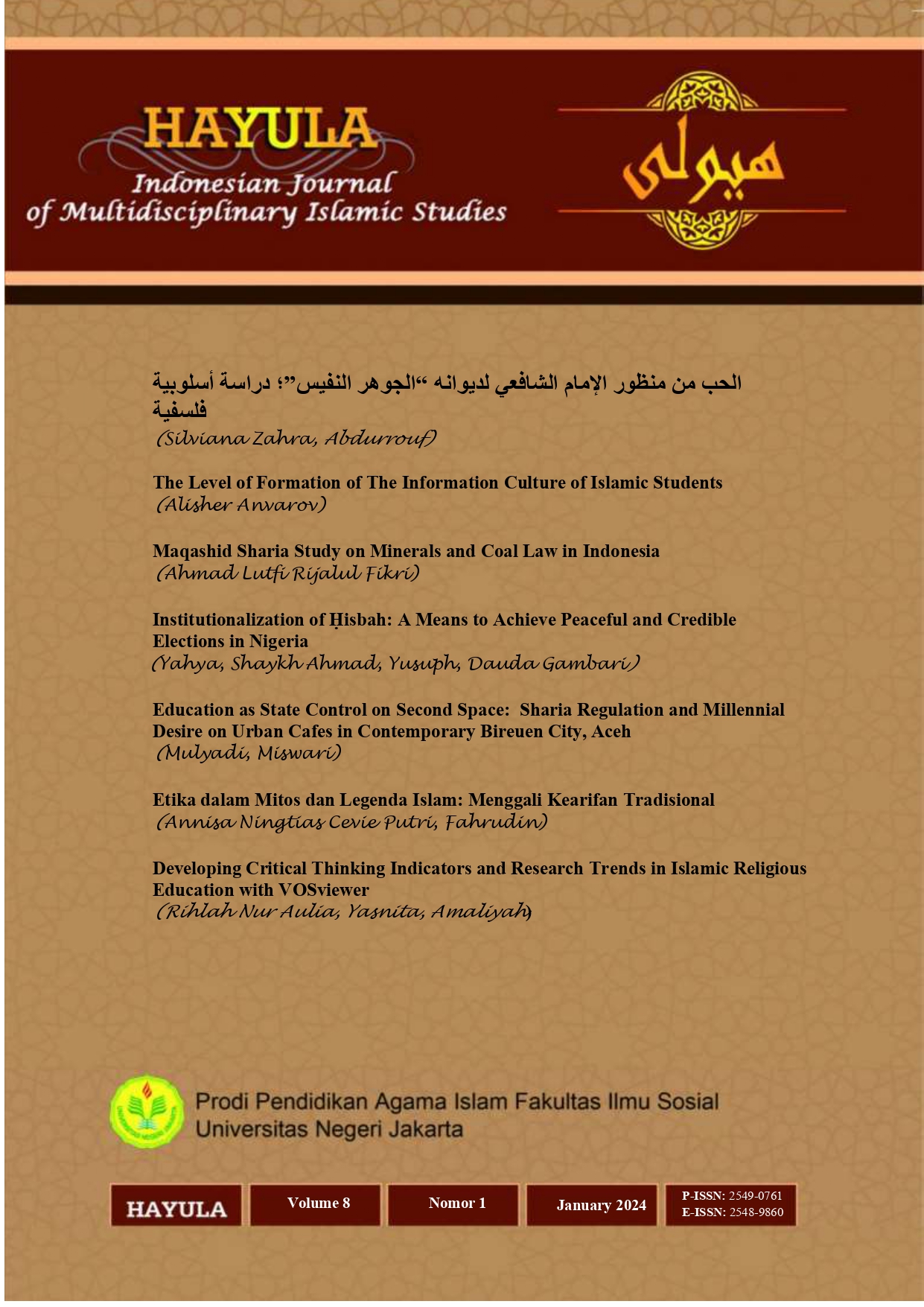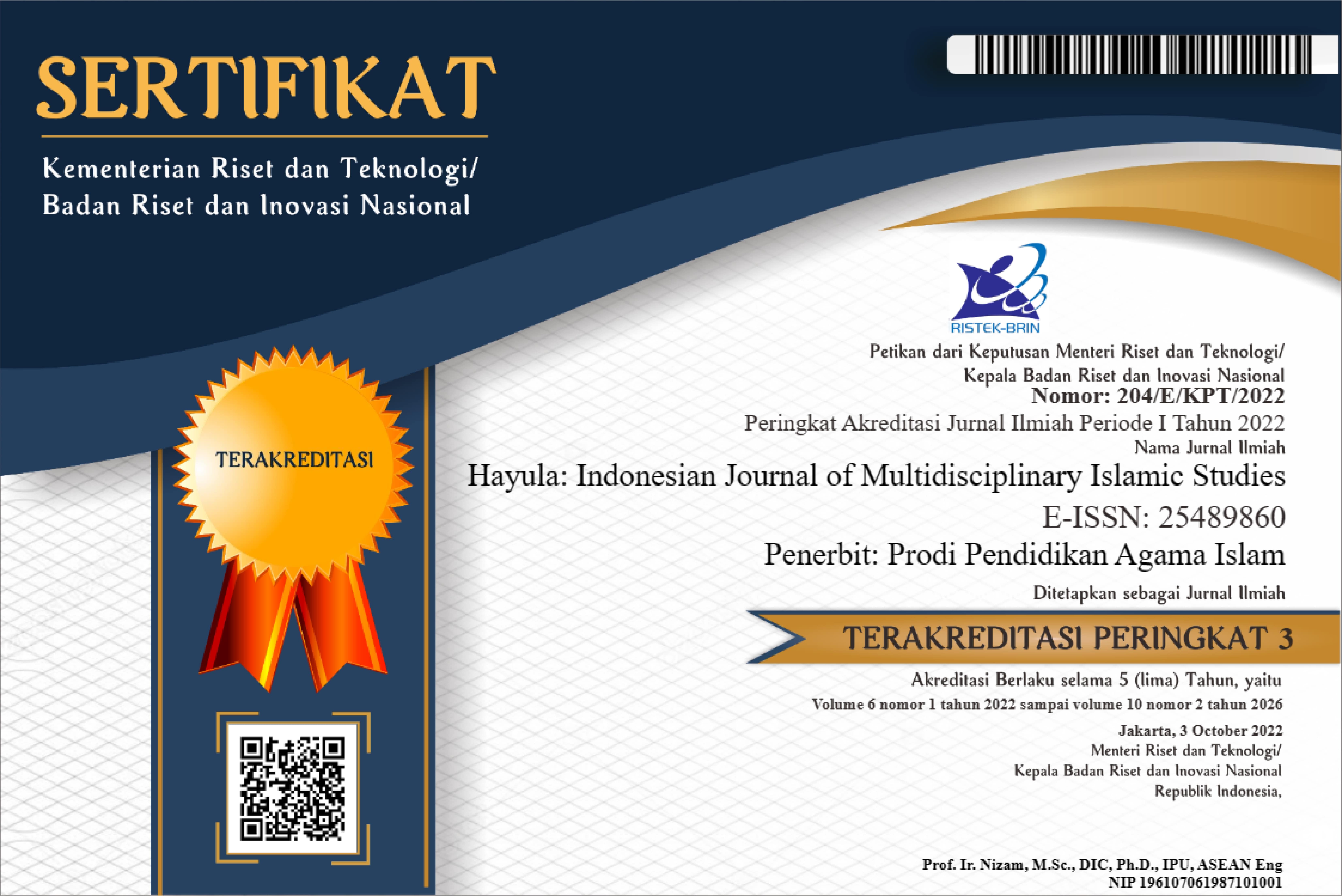Developing Critical Thinking Indicators and Research Trends in Islamic Religious Education with VOSviewer
DOI:
https://doi.org/10.21009/hayula.008.01.07Keywords:
Critical thingking skill, islamic religious educationAbstract
This research aims to develop indicators of students' critical thinking and find the state of the art by using Vos Viewer. One way to develop critical thinking indicators is through research. The teacher's job besides teaching is to conduct research. Research is said to be good if it finds elements of new findings so that it has a contribution both to science and to life. One of the difficulties in research is finding novelty, nowadays with the Vos Viewer application it is easy to find the novelty of a research variable, such as the critical thinking variable. The research subject is students in Islamic educational institutions. The object or focus of the research is to develop indicators of students' critical thinking in learning Islamic religious education. In addition, the research aims to analyze the opportunities and development of research trends related to critical thinking in Islamic learning. This research is important as a way to help Islamic religious education teachers develop critical thinking indicators as an effort to familiarize students with reading literacy and numeracy in accordance with the demands of the independent curriculum. The method used is bibliometric by collecting article data from 2018-2022 through Google Scholar and Scopus sites with Publish or Perish software for 1,000 journals. The results of the study describe that critical thinking indicators can be developed through familiarizing students with analyzing, evaluating, and analyzing.
References
Bunge, M. B. (1997). Richard Paul Bunge, M.D. Experimental Neurology, 148(2), 395–396. https://doi.org/10.1006/exnr.1997.6726
Cahyono, B. (2017). Analisis Ketrampilan Berfikir Kritis Dalam Memecahkan Masalah Ditinjau Perbedaan Gender. Aksioma, 8(1), 50. https://doi.org/10.26877/aks.v8i1.1510
Frydenberg, M., & Andone, D. (2011). “Learning for 21 st.” ” Journal; Century Skills.
Mardhiah, I., Hadiyanto, A., Amaliyah, A., & Hakam, A. (2021). Developing Learning Competencies of Multicultural and Local Wisdom Values-Based Islamic Religious Education in Higher Education in Indonesia. Hauula: Indonesian Journal of Multidisciplinary Islamic Studies, 5(1), 81–92. https://doi.org/10.21009/005.01.04
Narulita, S., Hyangsewu, P., & Diens, A. (2022). Moderate Muslim Characters in The Quran and Its Implementation in Islamic Religious Education Learning in Public Universities. Jurnal Online Studi Al-Qur’an, 18(1), 75–90. https://doi.org/10.21009/jsq.018.1.04
Reeder, H. (1984). The Nature of Critical Thinking. Informal Logic, 6(2), 1–8. https://doi.org/10.22329/il.v6i2.2729
Shuhaimi, Joharri, Hapini Awang, and Mohd Fairuz Jaafar. 2024. “Worldwide Research history and Trends on Blockchain Applications in Education : A Bibliometric Analysis , 2017-2022.” Multidisciplinary Reviews 7(3).
Taufiqurrahman, T., Heryandi, M. T., & Junaidi, J. (2018). Pengembangan Instrumen Penilaian Higher Order Thinking Skills Pada Mata Pelajaran Pendidikan Agama Islam. Jurnal Pendidikan Islam Indonesia, 2(2), 199–206. https://doi.org/10.35316/jpii.v2i2.74
Tilaar, H. A. R. (2011). Pedagogik Kritis, perkembangan, substansi, dan perkembangannya di Indonesia. Rineka Cipta.
Wagner, T. (2010). Overcoming The Global Achievement Gap. Mass: Harvard University.
Zulfa Indah Pratiwi, & Dewi Maharani. (2020). Penerapan Pembelajaran Pendidikan Agama Islam (PAI) Berbasis Higher Order Thinking Skills (Hots). Jurnal Qiroah, 10(2), 57
Downloads
Published
How to Cite
Issue
Section
License
Authors who publish with this Journal agree to the following terms:
- Author retain copyright and grant the journal right of first publication with the work simultaneously licensed under a creative commons attribution licensethat allow others to share the work within an acknowledgement of the work’s authorship and initial publication of this journal.
- Authors are able to enter into separate, additional contractual arrangementfor the non-exclusive distribution of the journal’s published version of the work (e.g. acknowledgement of its initial publication in this journal).
- Authors are permitted and encouraged to post their work online(e.g. in institutional repositories or on their websites) prior to and during the submission process, as it can lead to productive exchanges, as well as earlier and greater citation of published works.
Users/public use of this website will be licensed to CC BY







